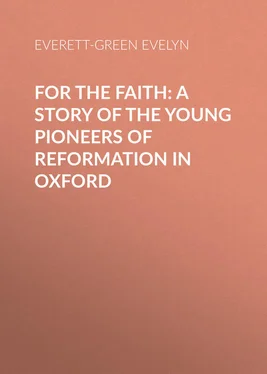Evelyn Everett-Green - For the Faith - A Story of the Young Pioneers of Reformation in Oxford
Здесь есть возможность читать онлайн «Evelyn Everett-Green - For the Faith - A Story of the Young Pioneers of Reformation in Oxford» — ознакомительный отрывок электронной книги совершенно бесплатно, а после прочтения отрывка купить полную версию. В некоторых случаях можно слушать аудио, скачать через торрент в формате fb2 и присутствует краткое содержание. Жанр: foreign_antique, foreign_prose, на английском языке. Описание произведения, (предисловие) а так же отзывы посетителей доступны на портале библиотеки ЛибКат.
- Название:For the Faith: A Story of the Young Pioneers of Reformation in Oxford
- Автор:
- Жанр:
- Год:неизвестен
- ISBN:нет данных
- Рейтинг книги:5 / 5. Голосов: 1
-
Избранное:Добавить в избранное
- Отзывы:
-
Ваша оценка:
- 100
- 1
- 2
- 3
- 4
- 5
For the Faith: A Story of the Young Pioneers of Reformation in Oxford: краткое содержание, описание и аннотация
Предлагаем к чтению аннотацию, описание, краткое содержание или предисловие (зависит от того, что написал сам автор книги «For the Faith: A Story of the Young Pioneers of Reformation in Oxford»). Если вы не нашли необходимую информацию о книге — напишите в комментариях, мы постараемся отыскать её.
For the Faith: A Story of the Young Pioneers of Reformation in Oxford — читать онлайн ознакомительный отрывок
Ниже представлен текст книги, разбитый по страницам. Система сохранения места последней прочитанной страницы, позволяет с удобством читать онлайн бесплатно книгу «For the Faith: A Story of the Young Pioneers of Reformation in Oxford», без необходимости каждый раз заново искать на чём Вы остановились. Поставьте закладку, и сможете в любой момент перейти на страницу, на которой закончили чтение.
Интервал:
Закладка:
Evelyn Everett-Green
For the Faith: A Story of the Young Pioneers of Reformation in Oxford
The story of these young pioneers of reformation in Oxford has been told by many historians. But there are slight discrepancies in the various accounts, and it is not quite clear who were the small minority who refused the offered reconciliation, and stood firm to the last. But there is no doubt that John Clarke, Henry Sumner, and one other, whose name varies in the different accounts, died from the effects of harsh imprisonment, unabsolved, and unreconciled to the offended church, and that Clarke would probably have perished at the stake had death not taken him from the hands of his persecutors.
There is equally no doubt that Dalaber, Ferrar, Garret, and many others "recanted," as it was called, and took part in the burning of books at Carfax. But these men must not be too hastily condemned as cowards and renegades. Garret, Ferrar, and several others died for their faith in subsequent persecutions, whilst others rose to eminence in the church, which was soon to be reformed and purified of many of the errors against which these young men had protested. It is probable, therefore, that they were persuaded by gentle arguments to this act of submission. They were not in revolt against their faith or the church, but only eager for greater liberty of thought and judgment. Kindly persuasion and skilful argument would have great effect, and the sense of isolation and loss incurred by sentence of excommunication was such as to cause acute suffering to the devout. There is no doubt that Wolsey won over Thomas Garret by kindliness, and not by threats or penalties; and it is to his honour, and to that of the authorities of Oxford, that, after the first panic, they were wishful to treat the culprits with gentleness, save those few who remained obstinate. And even these were later on given back to their friends, although, as it turned out; it was only to die.
Chapter I: The House by the Bridge
"Holy Church has never forbidden it," said John Clarke, with a very intent look upon his thoughtful, scholar's face.
A young man who stood with his elbow on the mantelshelf, his eye fixed eagerly on the speaker's face, here broke in with a quick impetuosity of manner, which seemed in keeping with his restless, mobile features, his flashing dark eyes, and the nervous motion of his hands, which were never still long together.
"How do you mean? Never forbidden it! Why, then, is all this coil which has set London aflame and lighted the fires of Paul's Yard for the destruction of those very books?"
"I did not say that men had never forbidden the reading of the Scriptures in the vulgar tongue by the unlettered. I said that Holy Church herself had never issued such a mandate."
"Not by her Popes?" questioned the younger man hastily.
"A papal bull is not the voice of the Holy Catholic Church," spoke Clarke, slowly and earnestly. "A Pope is not an apostle; though, as a bishop, and a Bishop of Rome, he must be listened to with all reverence. Apostles are not of man or by man, but sent direct by God. Popes elected by cardinals (and too often amid flagrant abuses) cannot truly be said to hold apostolic office direct from the Lord. No, I cannot see that point as others do. But let that pass. What I do maintain, and will hold to with certainty, is that in this land the Catholic Church has never forbidden men to read the Scriptures for themselves in any tongue that pleases them. I have searched statutes and records without end, and held disputations with many learned men, and never have I been proven to be in the wrong."
"I trow you are right there, John Clarke," spoke a deep voice from out the shadows of the room at the far end, away from the long, mullioned window. "I have ever maintained that our Mother the Holy Church is a far more merciful and gentle and tolerant mother than those who seek to uphold her authority, and who use her name as a cloak for much maliciousness and much ignorance."
Clarke turned swiftly upon the speaker, whose white head could be plainly distinguished in the shadows of the panelled room. The features, too, being finely cut, and of a clear, pallid tint, stood out against the dark leather of the chair in which the speaker sat. He was habited, although in his own house, in the academic gown to which his long residence in Oxford had accustomed him. But it was as a Doctor of the Faculty of Medicine that he had distinguished himself; and although of late years he had done little in practising amongst the sick, and spent his time mainly in the study of his beloved Greek authors, yet his skill as a physician was held in high repute, and there were many among the heads of colleges who, when illness threatened them, invariably besought the help of Dr. Langton in preference to that of any other leech in the place. Moreover, there were many poor scholars and students, as well as indigent townsfolk, who had good cause to bless his name; whilst the faces of his two beautiful daughters were well known in many a crowded lane and alley of the city, and they often went by the sobriquet of "The two saints of Oxford."
This was in part, perhaps, due to their names. They were twin girls, the only children of Dr. Langton, whose wife had died within a year of their birth. He had called the one Frideswyde, after the patron saint of Oxford, at whose shrine so many reputed miracles had been wrought; and the other he named Magdalen, possibly because he had been married in the church of St. Mary Magdalen, just without the North Gate.
To their friends the twin sisters were known as Freda and Magda, and they lived with their father in a quaint riverside house by Miltham Bridge, where it crossed the Cherwell. This house was a fragment of some ecclesiastical building now no longer in existence, and although not extensive, was ample enough for the needs of a small household, whilst the old garden and fish ponds, the nut walk and sunny green lawn with its ancient sundial, were a constant delight to the two girls, who were proud of the flowers they could grow through the summer months, and were wont to declare that their roses and lilies were the finest that could be seen in all the neighbourhood of Oxford.
The room in which the little company was gathered together this clear, bright April evening was the fragment of the old refectory, and its groined and vaulted roof was beautifully traced, whilst the long, mullioned window, on the wide cushioned seat on which the sisters sat with arms entwined, listening breathlessly to the talk of their elders, looked southward and westward over green meadowlands and gleaming water channels to the low hills and woodlands beyond.
Oxford in the sixteenth century was a notoriously unhealthy place, swept by constant pestilences, which militated greatly against its growth as a university; but no one could deny the peculiar charm of its situation during the summer months, set in a zone of verdure, amid waterways fringed with alder and willow, and gemmed by water plants and masses of fritillary.
Besides the two sisters, their learned father, and the two young men in the garb of students who had already spoken, there was a third youth present, who looked slightly younger than the dark faced, impetuous Anthony Dalaber, and he sat on the window seat beside the daughters of the house, with the look of one who has the right to claim intimacy. As a matter of fact, Hugh Fitzjames was the cousin of these girls, and for many years had been a member of Dr. Langton's household. Now he was living at St. Alban Hall, and Dalaber was his most intimate friend and comrade, sharing the same double chamber with him. It was this intimacy which bad first brought Anthony Dalaber to the Bridge House; and having once come, he came again and yet again, till he was regarded in the light of a friend and comrade.
Читать дальшеИнтервал:
Закладка:
Похожие книги на «For the Faith: A Story of the Young Pioneers of Reformation in Oxford»
Представляем Вашему вниманию похожие книги на «For the Faith: A Story of the Young Pioneers of Reformation in Oxford» списком для выбора. Мы отобрали схожую по названию и смыслу литературу в надежде предоставить читателям больше вариантов отыскать новые, интересные, ещё непрочитанные произведения.
Обсуждение, отзывы о книге «For the Faith: A Story of the Young Pioneers of Reformation in Oxford» и просто собственные мнения читателей. Оставьте ваши комментарии, напишите, что Вы думаете о произведении, его смысле или главных героях. Укажите что конкретно понравилось, а что нет, и почему Вы так считаете.












